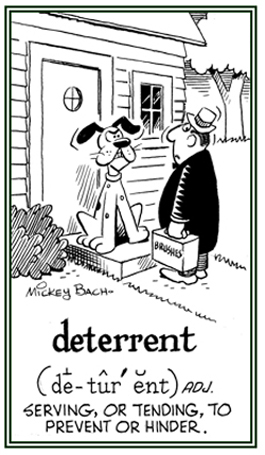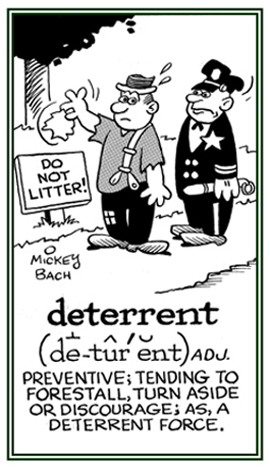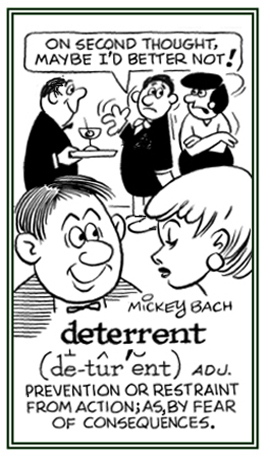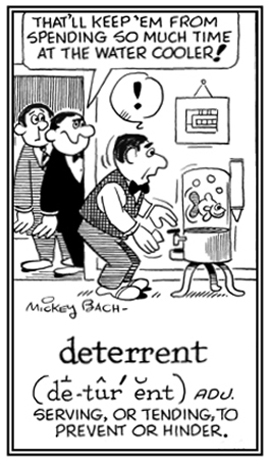terri-
(Latin: frightful, fearful; fear; fright; literally, causing terror)
Don't confuse this element with other words that are spelled in a similar way; such as, terrestrial or territory.
The term bioterror is often used loosely to describe nuclear, biological, and/or chemical (NBC) terrorism.
The U.S. government is especially worried about the Big Six bioterrorism threats: anthrax, smallpox, plague, tularemia, botulism toxin, and viral hemorrhagic fevers (like the Ebola virus).
While less well-known than the other diseases, tularemia and botulism toxins could conceivably be aerosolized, causing severe respiratory illness and paralysis, respectively.
"Skyscrapers, tunnels, subways, and their requisite heating and air-conditioning systems provide targets and also ways of attack for would-be bioterrorists."
2. To prevent, to check, to stop; to block or to bring to a standstill: Jim's father was determined to deter his son from driving during the storm.
3. Etymology: from Latin deterrere, "to frighten from, to discourage from"; composed of de-, "away" + terrere, "to frighten".

Go to this Word A Day Revisited Index
so you can see more of Mickey Bach's cartoons.
2. Using military strength as a way to defend a country or to retaliate strongly enough to prevent an enemy from attacking.
The deterrent weather is forcing a lot of people to stay in their homes instead of going shopping or even travelling to the places where they work.




Go to this Word A Day Revisited Index
so you can see more of Mickey Bach's cartoons.
2. The sabotage of the activities of individuals or corporations; such as, industrial companies, considered to be polluting or destroying the natural environment.
2. Extremely bad; horrible; extreme in extent or degree: "That was a terrible movie."
3. Exciting terror, awe, or great fear; dreadful; awful.
4. Causing great fear or alarm; dreadful: "During the storm there was a terrible bolt of lightning.
5. Formidably great: "She took on a terrible responsibility."
2. Informal: Extremely; very: "It's terribly late and I'm terribly sorry, but you will have to go now."
3. To a great extent; very much: "Would you mind terribly if we go home now?
2. Informal: Causing awe or amazement; extraordinarily great or intense.
3. Extremely good; wonderful: "We had a terrific vacation."
4. Etymology: from Latin terrificus, "causing terror or fear", from terrere, "fill with fear" plus root of facere, "to make".
Weakened sensed of "very great, severe"; such as, "I have a terrific headache" appeared in 1809. The colloquial sense of "excellent" began about 1888.

